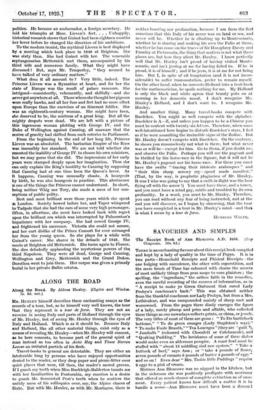ALONG THE ROAD
Ma. Hussy himself describes these enchanting essays as the records of a tour, but, as he himself very well knows, the tour that they represent is a tour de force. They are not an exercise in seeing Italy and parts of Holland through the eyes of Mr. Huxley, but of seeing Mr. Huxley through the eyes of Italy and Holland. Which is as it should be. Because Italy and Holland, like all other material things, exist only as a means of revealing Mr. Huxley—when Mr. Huxley will consent, as he here consents, to become part of the general spirit of man instead as too often in Antic Hay and Those Barren Leaves an irritated particle of his flesh.
Travel-books in general are detestable. They are either an intolerable brag by persons who have enjoyed opportunities denied to the reader, or they drop paper and picnic-litter over quiet places that were, till then, the reader's sacred groves. If I gnash my teeth when Miss Buckleigh-Balderton taunts me with her familiarities in Fontarabia, my emotion is a desire to gnash Mr. Somerstail Peat's teeth when he scatters the untidy mess of his soliloquies over, say, the Alpine chaces of Sixte. Hut' with- Mr. Huxley, as with Mr. Montague. there is neither -boasting nor profanation, because I am from the first conscious' that this Italy of his never- was on -lava or sea, and never will be.. Whether he is climbing up to Montesenario,
whether he is sharing and making his own the Palo at Siena, whether he has conic on the traces of Sir Humphrey Davey and Faraday at Pietramala, the thing that matters is not what these places are, but how they affect Mr. Huxley. I know perfectly well that Mr. Huxley isn't proud of having visited Monte- senario, and isn't jeering at me for having failed to. If he is proud, it is of himself ; and if he jeers, it is at me for not being him. But I, in spite of all temptation (and it is not incon- siderable) to suffer transmutation, prefer to remain myself. On the other hand, when he converts Holland into a text-book for the mathematician, he spoils nothing for me. My Holland is only the black and white apron that beauty puts on at morning in her domestic mood. I don't recognize Mr. Huxley's Holland, and I don't want to. I recognize Mr. Huxley.
And another thing. Many travel-books compete with Baedeker. You might as well compete with the alphabet. Baedeker is A—Z, and unless you happen to be a Chinese you must be content with twenty-six letters. Therefore, when some well-intentioned bore begins to disturb Baedeker's stars, I feel as if he were assaulting the invincible signs of the Zodiac. But Mr. Huxley doesn't compete with Baedeker. On the contrary, he shows you remorselessly not what is there, but what never was or will be—except for him. Go to Siena, if you doubt me, and observe the Palio. Perhaps you will see the pageant and be thrilled by the horse-race in the Square, but it will not be Mr. Huxley's pageant nor his horse-race. For these you must have the swifts " tracing their intricate arabesques " and " their thin sharp snowy cry—speed made manifest." (That, by the way, is prophetic plagiarism of Mr. Huxley. It was I who was going to say that a swift in flight was the bow flying off with the arrow !) You must have these, and a tower, and you must have a mind gay, subtle and troubled by its own profundity. In a word, you must be Mr. Huxley. Therefore, you can read without any fear of being instructed, and at the end you will discover, as I began by observing, that the tour you have completed is a tour in Mr. Huxley's mind—and that is what I mean by a tour de force.
HUM-BERT WOLFE.


















































 Previous page
Previous page